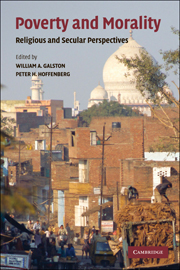Book contents
- Frontmatter
- Contents
- Contributors
- Acknowledgments
- 1 Introduction
- 2 Global Poverty and Unequal Development
- 3 The Karma of Poverty
- 4 Poverty and Morality in Christianity
- 5 Classical Liberalism, Poverty, and Morality
- 6 Confucian Perspectives on Poverty and Morality
- 7 Poverty and Morality
- 8 Hinduism and Poverty
- 9 The Problem of Poverty in Islamic Ethics
- 10 Jewish Perspectives on Poverty
- 11 Liberal Egalitarianism and Poverty
- 12 Marxism and Poverty
- 13 Poverty and Natural Law
- 14 Afterword
- Select Bibliography
- Index
- References
11 - Liberal Egalitarianism and Poverty
Published online by Cambridge University Press: 05 June 2012
- Frontmatter
- Contents
- Contributors
- Acknowledgments
- 1 Introduction
- 2 Global Poverty and Unequal Development
- 3 The Karma of Poverty
- 4 Poverty and Morality in Christianity
- 5 Classical Liberalism, Poverty, and Morality
- 6 Confucian Perspectives on Poverty and Morality
- 7 Poverty and Morality
- 8 Hinduism and Poverty
- 9 The Problem of Poverty in Islamic Ethics
- 10 Jewish Perspectives on Poverty
- 11 Liberal Egalitarianism and Poverty
- 12 Marxism and Poverty
- 13 Poverty and Natural Law
- 14 Afterword
- Select Bibliography
- Index
- References
Summary
Liberal egalitarianism is an account – or, more accurately, a family of accounts – of the justice of political, social, and economic institutions. There are several fundamental moral commitments that most liberal egalitarian theorists share. One is to moral individualism – in other words, that moral duties are primarily owed to individuals and only derivatively (if at all) to the groups or corporate bodies made up of individuals. Another is that the rights and liberties of individuals are highly important. This is the liberal strain in the accounts. Although there is disagreement about whether some claimed rights are actually rights, and about the exact content, extent, and importance of others, there is little disagreement about the moral importance of certain core individual rights and liberties, such as freedoms of conscience and religion; freedom from invidious discrimination on the basis of race, ethnicity, gender, or sexual orientation; the rights to free speech and assembly; and the right to participate as an equal in the political process. The importance of such rights is usually understood as proscribing the achievement of social goals, however desirable, by means that would violate individual rights. Although they take rights seriously, most liberal egalitarians, unlike natural rights theorists, would not affirm the existence of natural rights. Liberal egalitarians can be distinguished from classical liberals or libertarians in particular in part by a rejection of natural rights to property, whether in oneself or the world. A third commitment, the egalitarian strain in the accounts, is that socioeconomic inequalities must be limited in order to be just.
Insofar as liberal egalitarian accounts of justice typically address the morality of political, social, and economic institutions, they provide the basis for judgments concerning the justified use of coercive power by public institutions. For example, one very general way to think about the liberal egalitarian approach to poverty is that it is usually, although not necessarily solely, in virtue of its egalitarian commitment that eradication of poverty is endorsed, but that its liberal commitment constrains what public agencies may permissibly do to prevent or eradicate poverty and limits the kind of justifications that public agencies may use to express their concern. For example, a liberal egalitarian appalled at severe poverty would nonetheless typically believe it to be unjust for a public agency to compel citizens into prolonged servitude to eradicate the poverty, and for such an agency to justify policies directed toward bringing persons out of poverty on grounds that it would be pleasing to God, even if it is the case that many citizens, including the liberal egalitarian, reasonably believe this.
- Type
- Chapter
- Information
- Poverty and MoralityReligious and Secular Perspectives, pp. 220 - 241Publisher: Cambridge University PressPrint publication year: 2010

